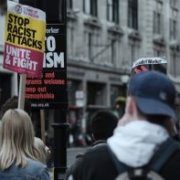Ayanna Pressley Introduces Sweeping Criminal Justice Reform Resolution
Ayanna Pressley Introduces Sweeping Criminal Justice Reform Resolution

Rep. Ayanna Pressley (D-Mass), unveiled a sweeping criminal justice reform resolution on Thursday that could begin dismantling a racist system that disproportionately targets, incarcerates, and kills members of Black, Latinx, and Indigenous communities.
The United States, a nation addicted to punishment and cages, is the number one jailer in the world, something that Pressley is seeking to change. The first words of her resolution—”Recognizing that the United States has a moral obligation to meet its foundational promise of guaranteed justice for all”—echo Dr. Martin Luther King’s call out of the same hypocrisy.
“All we say to America is, ‘Be true to what you said on paper.’” — Dr. Martin Luther King, Jr., April 3, 1968
“The criminal legal system is racist, xenophobic, rogue, and fundamentally flawed beyond reform,” Pressley told reporters on a call Wednesday. “It must be dismantled and radically transformed through a large-scale decarceration effort.”
Pressley lays out several potentially transformative proposals in her resolution, which she calls The People’s Justice Guarantee, including: reinstituting the Department of Justice’s role in investigating police departments that repeatedly violate citizens’ civil rights, and establishing adequate over- sight of consent decrees. While no police officers were held accountable for civil rights violations under Eric Holder’s DoJ—nor, of course, thus far under William Barr’s—the ability to check power is still necessary.
Pressley also calls for banning law enforcement from using facial recognition software; stopping the transfer of military equipment to local police departments (the militarization of police forces became a national point of contention during the Ferguson uprising); dismantling and rebuilding a compassionate, just, and humane immigration; providing resources for non-law enforcement led, community-based violence and trauma interruption models; banning the death penalty; and the decriminalization of addiction and sex work, among other proposals.
Yes, That Crime Bill
In a move that is powerful in both historical and contemporary contexts, Pressley calls for the federal government to provide tax incentives to local governments, as well as for states that repeal Truth in Sentencing and Three Strikes provisions and that reduce their prison populations by 2035. Under the resolution, “communities would be encouraged to repeal and dismantle the Violent Crime Control and Law Enforcement Act of 1994 and other federal policies that caused the country’s prison population to explode since the 1970s,” the Appeal reports.
When the crime bill passed in 1994, it was with the help of 22 members of the Congressional Black Caucus and the support of NIMBY Black community leaders who believed that increased punitive punishment would save “good” children from “bad” children. Professor Michelle Alexander explained that some of these leaders were expecting reinvestment in Black communities—schools, better housing, health care and jobs. But that’s not what happened.
Before the 1994 crime bill could make it through the House, it was stripped of the Racial Justice Act, which would have allowed death row inmates to use data showing racial inequities in sentencing. The bill was also stripped of $3.3 billion—two-thirds of it from prevention programs. A provision that would have made 16,000 low-level drug offenders eligible for early release was also removed.
More states would soon be passing their own version of “three strikes” laws, and they would be awarded Truth in Sentencing grants to build and expand prisons.
Pressley’s plan to flip the inherently corrupt structure of 1994 bill by awarding states that reduce, not explode prison and jail populations, is what institutional justice looks like.
Click here to read more on Pressley’s resolution, The People’s Justice Guarantee.









